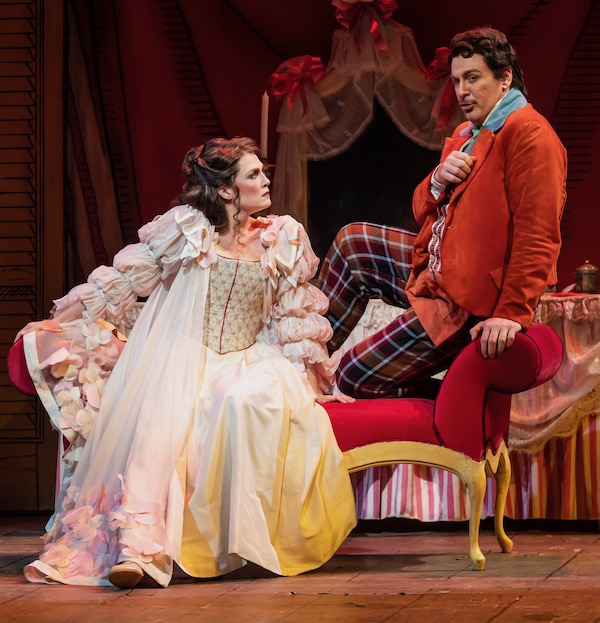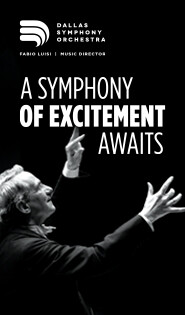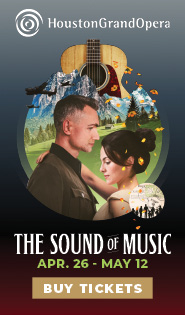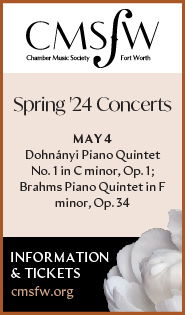Dallas Opera’s “Barber” is a whimsical, vocally stellar delight

When Gioachino Rossini’s Barber of Seville premiered in 1816, it was one of the most disastrous opening nights in operatic history. The 24-year-old upstart composer had set the same de Beaumarchais story as the revered Giovanni Paisiello in an established opera of the same name and Paisiello instigated his followers to hiss and boo throughout the premiere. The Rossini debut had other issues, including late singer substitutions, a Basilio who suffered a persistent nosebleed and an intruding feline that meandered onstage with incessant meowing.
Yet it was Rossini’s Barber of Seville that would quickly win popularity and push Paisiello’s work into obscurity. Rossini’s Barber served as a pivotal moment in the evolution of opera buffa from hackneyed and predictable to something exciting and unexpected. The hilarity of librettist Cesar Strebini’s caricatured subjects and the vibrant musical language codified Rossini as the quintessential composer of Italian comic opera after the work’s second performance. His Barber lays claim to a slew of operatic favorites that continue to dominate the canon today.
Dallas Opera’s The Barber of Seville, which opened Saturday evening at the Winspear Opera House, was in the finest tradition, well sung, abundantly farcical, and unyielding in its whimsy.
The major accomplishment of this production is its powerhouse cast and the apt musicianship of the TDO orchestra, conducted by Lina Gonzalez-Granados, an alumna of the Hart Institute for Women Conductors. There is room for some polishing, yet the principals ensemble, and orchestra achieve a palpable level of comic energy from the curtain that never let up.
Mezzo-soprano Wallis Giunta and tenor Alasdair Kent strike an endearingly awkward dynamic as Rosina and Count Almaviva,—our heroic lovers at the center of the narrative.
Giunta’s expressive depth and roundness of tone set affectionately against Kent’s more silvery lilt. Her delivery of Rosina’s cavatina, “Una voce poco fa,” was sparkled with vitality and musical humor. The mezzo’s vocal prowess was evident in her effortlessly flexible and decorative ornamentation, and she was campily amusing in her pantomime of a fake foot injury in Act II.
Kent’s lyrical tone was graceful and light, equal to the tasks demanded by the score. His heady mix near the top of the register gave Almaviva’s many high C’s a welcome youthful character, as in the opening aria, “Ecco ridente in cielo.” Tender and lithe, the amorous serenade “Se il mio nome saper voi bramate”—where he first pines for Rosina—was affectionately delivered on the breath, which set nicely against minimal guitar accompaniment. Kent also displayed versatility, both vocally and in his acting, as the character transitions humorously through a number of disguises. As a drunken soldier, he was brash and bracing, and as the prickly music instructor Alonso, Kent employed a nasal placement that was just the right amount of grating.
The standout in this production is baritone Lucas Meachem in the beloved role of Figaro, the title Barber. Emerging from among the audience in the house with his entrance aria “Largo al factotum” Meachem overwhelms the space with charm and ability. His patter is tight and clear, and as an actor, his comedic timing is consistently on point. He plays with the use of registers to engage even further with Rossini’s musical humor in a way that is just shy of obnoxious, and therefore, infectious and effective. Meachem also managed to blend neatly with the other principals, providing a rich rumble that undergirded the duets and ensembles.
Bass-baritone Valeriano Lanchas in the role of the opera’s main antagonist—the lecherous and galumphing Doctor Bartolo—was at times a bit clumsy in vocal delivery, particularly in the patter passages where he was nearly inaudible. However, as a presence on stage and foil the rest of the cast, Lanchas deserves merit for his acting ability.
Adam Lau was a commanding Don Basilio. His aria “La calunnia è un venticello” demands a virtuosic crescendo, which the bass managed with fine attention. Soprano Courtney Maina was a surprisingly powerful presence as Berta, Bartolo’s maid. She held her own beautifully in the large ensemble numbers as one of only two female voices in the mix.
Alexander Rom’s preparation of the chorus proved effective against a powerhouse cast of singers. The “chaos without causality”—a term coined by Viennese journalist Karl Kraus to describe operetta—of Act I’s finale made for stimulating hijinks and drama.
This production, from Minnesota Opera and director Tara Faircloth in her TDO debut, blends Allen Moyer’s opulent set design and stylish period costuming by James Scott with almost vaudevillian stage direction—the juxtaposition of which created a hearty visual feast for operagoers.
Smart lighting design by Thomas C. Hase made the storm scene quite convincing, and David Zimmerman’s wig and makeup design added an appropriate amount of ham to the stage.
Dallas Opera’s production puts across the score’s witty sophistication albeit a bit broadly at times. Still, Saturday night’s audience undoubtedly enjoyed Rossini’s enduring comedy as evidenced by a raucous and prolonged ovation at the close of the evening.
Dallas Opera’s Barber of Seville runs through March 27. dallasopera.org


